Serving 445 students in grades Prekindergarten-5, Dalton Elementary School ranks in the bottom 50% of all schools in Colorado for overall test scores (math proficiency is bottom 50%, and reading proficiency is bottom 50%).
The percentage of students achieving proficiency in math is 20-24% (which is lower than the Colorado state average of 32%). The percentage of students achieving proficiency in reading/language arts is 30-34% (which is lower than the Colorado state average of 45%).
The student:teacher ratio of 16:1 is higher than the Colorado state level of 15:1.
Minority enrollment is 79% of the student body (majority Hispanic), which is higher than the Colorado state average of 50% (majority Hispanic).
Quick Stats (2025)
- Grades: Prekindergarten-5
- Enrollment: 445 students
- Student:Teacher Ratio: 16:1
- Minority Enrollment: 79%
- Overall Testing Rank: Bottom 50% in CO
- Math Proficiency: 20-24% (Btm 50%)
- Reading Proficiency: 30-34% (Btm 50%)
- Source: National Center for Education Statistics (NCES), CO Dept. of Education
Top Rankings
Dalton Elementary School ranks among the top 20% of public schools in Colorado for:
Category
Attribute
Diversity
School Overview
Dalton Elementary School's student population of 445 students has declined by 7% over five school years.
The teacher population of 27 teachers has grown by 28% over five school years.
Grades Offered
Grades Prekindergarten-5
(No virtual instruction)
(No virtual instruction)
Total Students
445 students
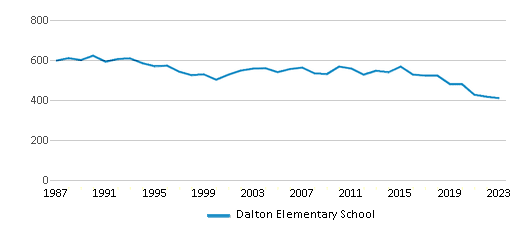
Gender %
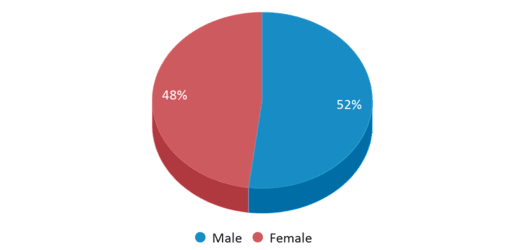
Total Classroom Teachers
27 teachers
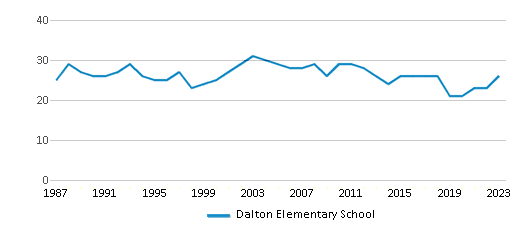
Students by Grade
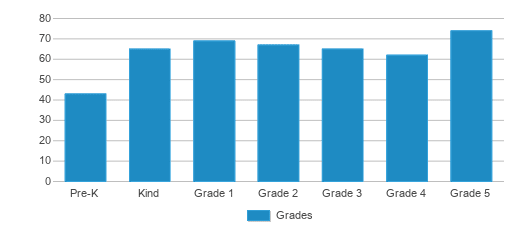
School Calendar
School Rankings
Dalton Elementary School ranks within the bottom 50% of all 1,779 schools in Colorado (based off of combined math and reading proficiency testing data).
The diversity score of Dalton Elementary School is 0.73, which is more than the diversity score at state average of 0.62. The school's diversity has stayed relatively flat over five school years.
Overall Testing Rank
#1115 out of 1779 schools
(Bottom 50%)
(Bottom 50%)
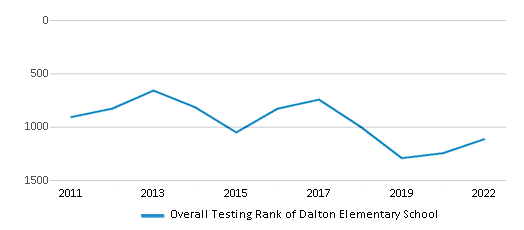
Math Test Scores (% Proficient)
20-24%
32%
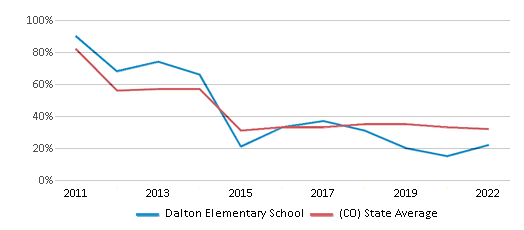
Reading/Language Arts Test Scores (% Proficient)
30-34%
45%
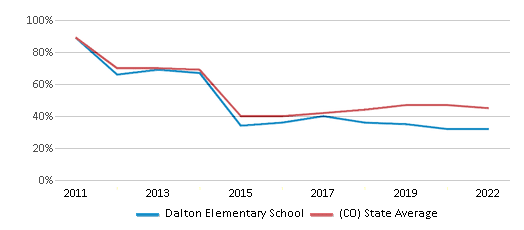
Student : Teacher Ratio
16:1
15:1
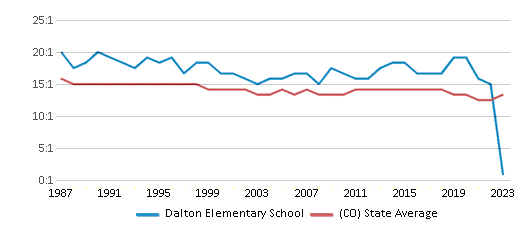
American Indian
n/a
1%
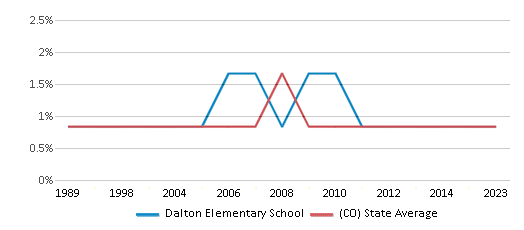
Asian
5%
3%
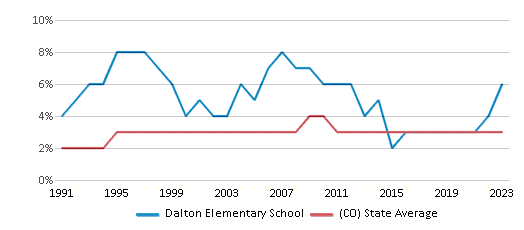
Hispanic
42%
36%
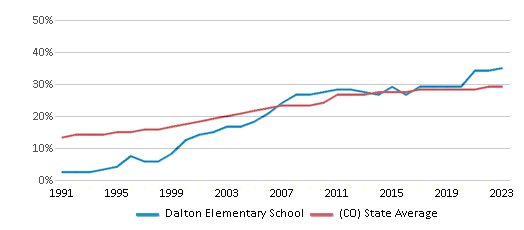
Black
18%
5%
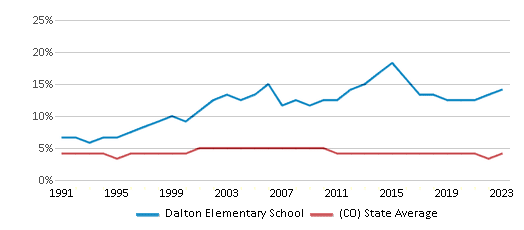
White
21%
50%
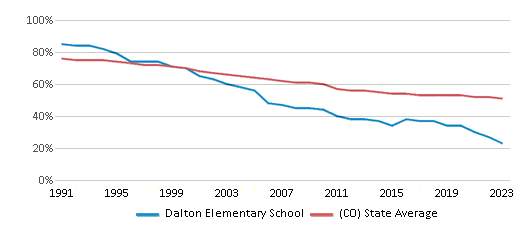
Hawaiian
1%
n/a
Two or more races
13%
5%
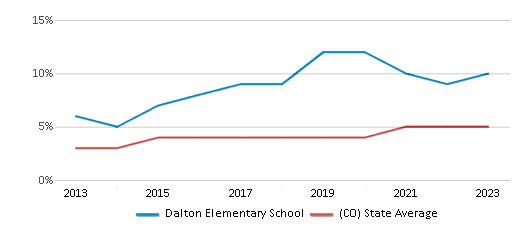
All Ethnic Groups
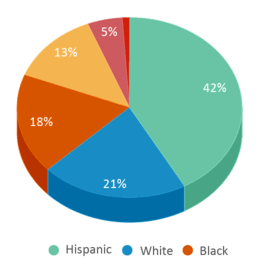
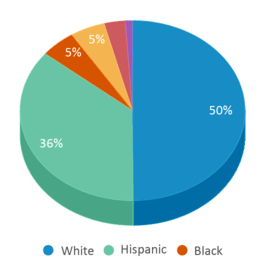
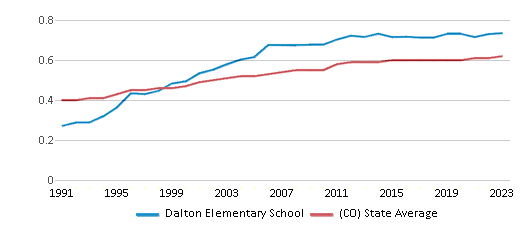
Eligible for Free Lunch
67%
39%
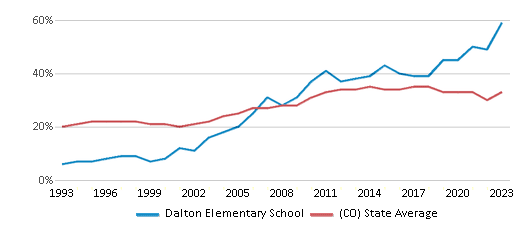
Eligible for Reduced Lunch
11%
6%
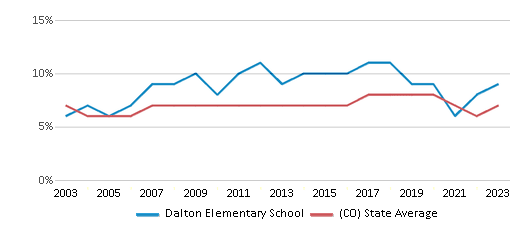
School Statewide Testing
School District Name
Source: National Center for Education Statistics (NCES), CO Dept. of Education
Profile last updated: 02/09/2025
Frequently Asked Questions
What is Dalton Elementary School's ranking?
Dalton Elementary School is ranked #1115 out of 1,779 schools, which ranks it among the bottom 50% of public schools in Colorado.
What schools are Dalton Elementary School often compared to?
Dalton Elementary Schoolis often viewed alongside schools like Vassar Elementary School by visitors of our site.
What percent of students have achieved state testing proficiency in math and reading?
20-24% of students have achieved math proficiency (compared to the 32% CO state average), while 30-34% of students have achieved reading proficiency (compared to the 45% CO state average).
How many students attend Dalton Elementary School?
445 students attend Dalton Elementary School.
What is the racial composition of the student body?
42% of Dalton Elementary School students are Hispanic, 21% of students are White, 18% of students are Black, 13% of students are Two or more races, 5% of students are Asian, and 1% of students are Hawaiian.
What is the student:teacher ratio of Dalton Elementary School?
Dalton Elementary School has a student ration of 16:1, which is higher than the Colorado state average of 15:1.
What grades does Dalton Elementary School offer ?
Dalton Elementary School offers enrollment in grades Prekindergarten-5 (No virtual instruction).
What school district is Dalton Elementary School part of?
Dalton Elementary School is part of Aurora Joint District No. 28 Of The Counties Of Adams And A School District.
In what neighborhood is Dalton Elementary School located?
Dalton Elementary School is located in the Aurora Knolls Hutchinson Heights neighborhood of Aurora, CO. There are 1 other public schools located in Aurora Knolls Hutchinson Heights.
School Reviews
5 2/16/2023
My daughter has attended Dalton Elementary for the past six years. The teachers (except one) all go above and beyond for their students. A new principal, as well as a new Assistant Principal, started a few years ago and the staff has much better leadership than it had under the previous personnel. The key to improving students'' grades/performance is parental involvement. Too many parents are NOT involved in their child's education - they just drop them off and pick them up. Each month the PTSO meetings (usually) have less than ten parents in attendance. Mostly it is staff and the PTSO board at the meetings. This is an awesome school where your child's learning abilities are only limited by the amount the parent/parents is/are invested.
Review Dalton Elementary School. Reviews should be a few sentences in length. Please include any comments on:
- Quality of academic programs, teachers, and facilities
- Availability of music, art, sports and other extracurricular activities
Recent Articles

School-to-Prison Pipeline Persists Despite Local, State and National Efforts
Inadequate funding and resources for schools, harsh zero-tolerance discipline policies, police presence in public schools, and de facto segregation continue to create school environments in which poor and minority students have little chance of succeeding. The result is a continuation of the school-to-prison pipeline that has been commonplace in the American education system for decades, despite federal, state and local efforts to curb the problem.

How the Arts Benefit Your Children Academically and Behaviorally
Often underfunded in the past, the arts are gaining a resurgence in support as research shows benefits for children academically, along with improvements in behavior and attendance.

February 05, 2025
Understanding the U.S. Department of Education: Structure, Impact, and EvolutionWe explore how the Department of Education shapes American education, from its cabinet-level leadership to its impact on millions of students, written for general audiences seeking clarity on this vital institution.





